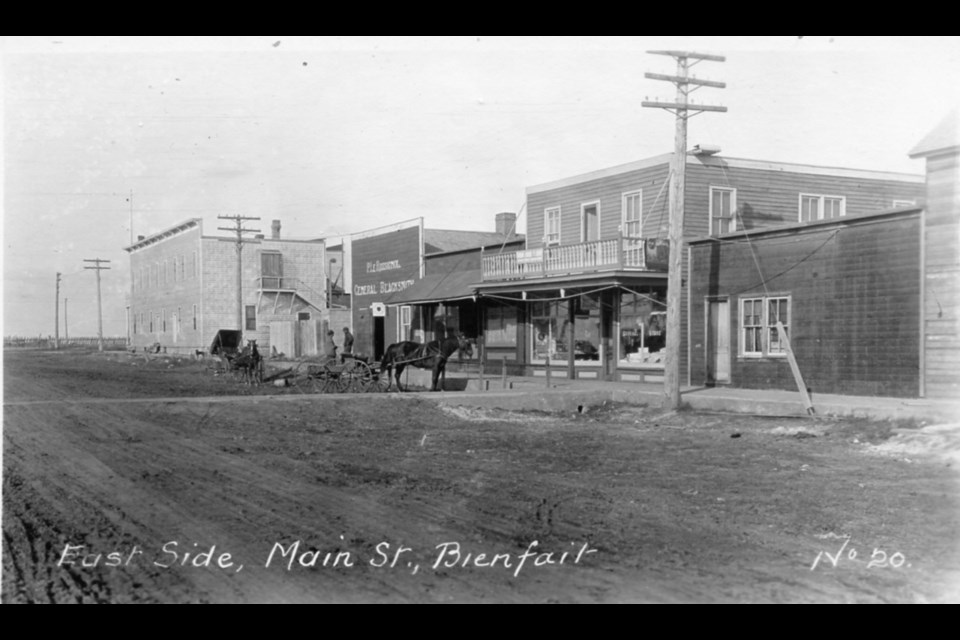Bienfait, a coal-mining town east of Estevan, has seen more than its share of trouble and the Bienfait hotel stood in mute witness to it all.
In 1904, the Canadian Pacific Railway opened Bienfait Mines Ltd. ten miles north of the U.S. border near Estevan. The railway station, miners’ cottages, stores and other buildings were built in 1905. The King Edward Hotel was built on the corner of Railway and Main in 1907. Gordon and Bertha White owned the two-storey wood frame building for so long, it became unofficially known as White’s Hotel.
White advertised the King Edward Hotel as “the best equipped village hotel in Saskatchewan.” The hotel featured hot soft-water baths, four billiard tables, three bowling alleys, a two-chair barber-shop and electrical refrigeration.
In 1915, when the province went dry, liquor became Bienfait’s main industry. Yorkton-based Harry Bronfman and his brothers set up a boozorium in the town called the Bienfait Export Liquor Company. By 1920, the boozorium stocked hundreds of cases of expensive Canadian and imported liquors, all of which was sold to American buyers from across the border.
There are stories about gangsters from Chicago staying at the White’s Hotel in Bienfait. Bertha White told the Leader-Post on July 19, 1980 that she never felt threatened by the rumrunners. “They never shot their guns in the hotel,” she said. “They were very nice in the dining room. Gordon … told the staff to serve them and not make a fuss over them and treat them like everybody else.”
On Oct. 4, 1922, Paul Matoff, brother-in-law of Sam and Harry Bronfman, was shot and killed in the office of the CPR station – directly across the street from White’s Hotel. Frank Earle, a hotel employee, witnessed the murder. While his men were loading bottles into the back of a rum runner’s truck, Matoff was inside counting the money.
Suddenly, the barrel of a sawed-off shotgun smashed through the station window, firing point-blank into Matoff’s back. The Americans stole $6,000 and Matoff’s diamond tiepin.
In the summer of 1920, P. M. Christopher, organizer for the One Big Union, came to Bienfait to address a mass meeting of miners in the district. On June 30, a vigilante group representing the coal mine operators broke into Christopher’s room at the King Edward Hotel in the middle of the night and kidnapped him.
According to the Regina Morning Leader, they drove him across the U.S. border and told him that if he ever returned, he’d be tarred and feathered. A decade later, in the fall of 1931, poverty led to a coal miners’ strike in and around Bienfait. On Sept. 29, three Bienfait miners were shot and killed by the RCMP during a miners’ parade in the streets of Estevan.
Forty years later, in August 1971, Wilf Gardiner, former Liberal СŔ¶ĘÓƵ for Melville, bought the Coalfields Hotel (the former King George Hotel) in Bienfait from Ann Sichello. “I bought the hotel because I love Saskatchewan’s small towns,” Gardiner told the Regina Leader-Post, “I am told the Coalfields Hotel … is one of the best small-town hotels in the province.”
In 1972, Heather Robertson interviewed Gardiner for her book, Grass Roots (1973). “He’s out to promote Bienfait,” Robertson wrote. “Already he’s organized a shuffleboard tournament and an Indian pow-wow in the beer parlor.” Gardiner changed the hotel’s name to the Plainsman.
There was a big wooden cut-out of Davy Crockett over the hotel’s main entrance and an Indian’s head with feathers over the bar which was called the Eagle’s Nest. Gardiner was the bartender, his wife did the cooking and cleaning, and his kids mopped up the pub on Sundays.
Today, the bar at the Bienfait hotel is called the Coal Dust Saloon.




